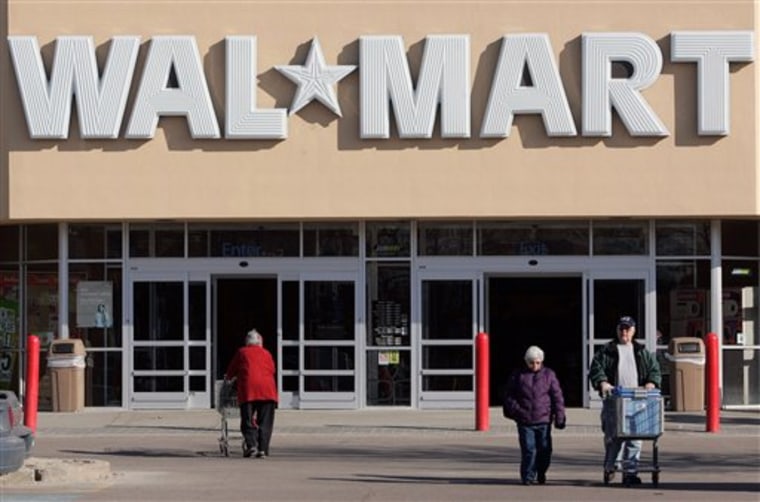Wal-Mart Stores Inc. said it's still pulling shoppers away from its main rivals and enjoying a rise in customer traffic as the world's largest retailer released better-than-expected fourth-quarter earnings Tuesday.
Shares of Wal-Mart rose more than 3 percent while the Dow Jones Industrials dropped more than 3 percent as investors grew more wary about the government's stimulus plan.
Still, Wal-Mart is hardly immune from economic pressures. It issued a cautious earnings outlook as it feels the pinch from the stronger dollar in its important international business, a trend officials said could hurt profits over the next three quarters.
And while more customers than before are relying on cash rather than their credit cards, Wal-Mart appears to be benefiting from the slew of store liquidations from the likes of Circuit City Stores Inc. and Linen 'N Things.
"Our performance relative to competitors has been exceptionally strong in the fourth quarter and throughout the year," said Mike Duke, Wal-Mart's new chief executive, in a pre-recorded call to investors on Tuesday. "We finished January strong and February is off to a good start," added Duke, who succeeded Lee Scott as CEO this month.
Wal-Mart's fourth-quarter profit fell 7.4 percent to $3.79 billion, or 96 cents per share, in the quarter ended Jan. 31, dragged down by the strong dollar and a charge from settling labor lawsuits. That compares with $4.096 billion, or $1.02 per share, a year earlier.
Analysts surveyed by Thomson Reuters had expected the company to earn 99 cents per share, excluding the after-tax charge for the settlement announced in December of 63 class-action wage and hour lawsuits. Excluding the impact of that, Wal-Mart earned $1.03 per share, which beat Wall Street earnings estimates.
Total sales rose to $109.12 billion from $107.34 billion. Sales at stores open at least a year, a key indicator of a retailer's health, rose 2.8 percent in the quarter.
Wal-Mart's U.S. sales rose 6 percent during the quarter, while business at its Sam's Club warehouse division was flat. Sales fell 8.4 percent at the international division, hurt by the lower value of currencies against the dollar. On a constant currency basis, international sales rose 9 percent, the company said.
"The currency turned against us," Chief Financial Officer Tom Schoewe said in an interview with The Associated Press. He noted that the stronger dollar hurt fourth-quarter results by 6 cents per share, or $250 million pretax.
Wal-Mart has been one of the few bright spots in retailing as financially squeezed shoppers look for cheaper options and cut back to necessities during the recession. Its renewed focus on low prices as well as its push for cleaner stores and more compelling merchandise have allowed it to pull ahead of rivals like Target Corp. and Costco Wholesale Corp.
"Wal-Mart is a clear outperformer in a challenging economy, benefiting not just from its price-value leadership, but also its upgraded soft-goods strategy that has infused the store with more compelling branded apparel names such as Norma Kamali, Ocean Pacific (Op), l.e.i., Danskin and Starter," analyst Todd Slater at Lazard Capital Markets wrote in a report released Tuesday.
Traffic is up for both the fourth quarter and for the year, said Eduardo Castro-Wright, president and chief executive of Wal-Mart's U.S. division.
While apparel has been a struggle, basics and seasonal fashions continue to do well, he said. And Wal-Mart's six merchandising units, from apparel to home furnishings, are performing better than the leading competitors in each area on a same-store basis, he said. Castro-Wright also cited double-digit sales growth in flat-panel TVs and gaming systems.
Still, as Schoewe noted, "the customer and (club) member remain very cautious." At Sam's Club, customers are focusing on daily necessities, not discretionary items like jewelry and furniture. And Schoewe said the decline in credit card usage was "amplified" in the quarter.
Wal-Mart now expects earnings for the fiscal first quarter of 72 cents to 77 cents per share, while analysts were projecting 77 cents per share. For the full year, Wal-Mart expects a profit of $3.45 per share to $3.60 per share. Analysts expect $3.59 per share.
Schoewe said the projections assume currency rates will remain about the same as they were at the end of its 2009 fiscal year — which would hurt its year-over-year comparison of fiscal 2010 earnings per share by approximately 13 cents per share.
Last week, Wal-Mart announced that it will cut up to 800 jobs at its headquarters as it makes changes, including cutting the number of new stores it will build this year. It's also cutting inventory.
Schoewe told investors that the company expects capital expenditures for the current fiscal year in a range of $12.5 billion to $13.5 billion, down from a range of $13 billion to $14.5 billion offered in October.
Wal-Mart also said it planned to restart its share buyback program this year, after pulling back in mid-October amid instability in the credit markets. Schoewe said that while the credit markets are "not back to normal, things are far more stable."
